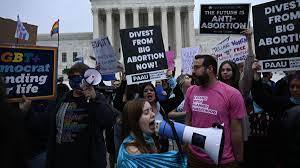(Trends Wide Business) — Reproductive rights activists are concerned that women will lose access to abortion in some parts of the United States. Economists are also concerned that restricting reproductive freedom comes at an economic cost to the nation.
The US Supreme Court may be willing to overturn the landmark Roe v. Wade from 1973 as soon as next month, according to a recently leaked draft opinion. Thirteen states have enacted laws that would immediately ban abortion if the sentence is overturned.
The decision is generally believed to be more ideologically and politically motivated than an attempt to protect women from worse consequences. These include financial hardship, limited ability to pursue higher education and move up the socioeconomic ladder, as well as poorer health outcomes for women who rely on clinics for preventive care. According to economists, all this would affect the labor force and economic production, and would increase the need for public aid.
The consequences are likely so wide-ranging and far-reaching that they are difficult to quantify, said Jason Lindo, an economics professor at Texas A&M.
Furthermore, it comes at a time when the share of women in the workforce, which fell sharply during the Covid-19 recession, has yet to recover to pre-pandemic levels.
The economic burden
Taking away a woman’s right to choose if and when she wants to have a child has serious consequences for her career and economic circumstances, Lindo told Trends Wide Business.
Last week, Treasury Secretary Janet Yellen told lawmakers during a hearing that restricting women’s reproductive rights would have “very detrimental effects on the economy.”
“Roe v. Wade and access to reproductive health services, including abortion, helped increase participation in the world of work,” said Yellen. “It allowed a lot of women to finish their studies. That increased their earning potential. It allowed women to plan and balance their families and careers.”
Last year, after Texas lawmakers moved to ban abortion in the state, 154 economists filed an amicus brief with the Supreme Court in support of upholding reproductive freedoms in the United States so that women can develop its full economic and educational potential.
Data from the landmark Turnaway study at the University of California, San Francisco, shows that household finances are a major factor in the decision to terminate an unwanted pregnancy. An analysis of the data by the National Bureau of Economic Research shows that the majority of women attempting to terminate a pregnancy near the limits of gestation had incomes below the poverty line.
For their part, women who were denied abortions had higher rates of poverty, higher unemployment and greater need for government assistance. This, in turn, affects the economic well-being and prospects of their children, according to economists.
“There is a huge literature showing the long-term effects of the economic circumstances of the household in which a child grows up. On educational attainment, adult earnings, use of welfare programs, involvement in delinquency , etc. The list is endless,” says Lindo.
Health and security
Economists are also concerned that women’s health care in general will suffer as a result of restricting or banning abortions. For many women, clinics that offer family planning services are also often the local option for preventive care, including Pap and cancer screenings. Easy access to these clinics plays a crucial role in your healthcare.
“When the distance to the nearest clinic increases, preventive care rates go down,” says David Slusky, an associate professor of economics at the University of Kansas. And that can lead to worse health outcomes.
“If a woman of childbearing age dies, it has enormous economic consequences,” he added. “She is someone that society has invested in and that she has many productive financial years ahead of her.”





